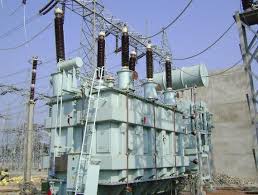Richards Adeniyi
Over 693 containers of Power equipment abandoned at the ports and which formed parts of the equipment imported into the country from the $6.3bn voted for the Obasanjo’s power equipment have bene recovered by the Transmission Company of Nigeria (TCN).
But there are more than 200 others that the company is still tracking after they were auctioned by the Nigeria Customs Service (NCS).
According to the firm, the recovery was achieved recently as it revealed that some of the containers had been stranded at various ports for about 15 years as the entire nation remained in darkness.
A top senior official recently spoke on conditions of anonymity that for years, hundreds of containers of power equipment had littered the ports vicinity for years un-cleared before the Customs management later resolved to auction them. These abandoned equipment were part of those brought into the country by the Obasanjo administration and which had remained stranded at the various ports for about 15 years.
Addressing journalists in Abuja recently, TCN’s Managing Director, Usman Mohammed said some of the power equipment had been auctioned, but noted that the firm was going after the auctioneers to recover the 800 containers that the Obasanjo administration imported into the country to solve the energy crisis that has put the nation in darkness for several years now.
“We were able to recover 693 containers out of a total of 800 containers that had been in the ports.
Some of these containers have been there for 15 years; others have been auctioned and we had to trace the auctioneers to get the containers,” Mohammed said.
Nigeria energy nightmare has for some decades reached crisis level. The challenges of the nation’s energy sector have triggered many economic and industrial problems as many foreign and local industries have relocated to neighbouring countries where there is constant and affordable power supply.
Some that could not afford the huge cost of diesel to power their generating sets or relocate to other countries have died down thus worsening unemployment rate among youths in the country.
During the ex-President Olusegun Obasanjo regime, between 1999 and 2007, he embarked on a series of legal and regulatory reforms to address the twin issues of NEPA’s poor operational and financial performance. He amended the then prevailing laws (Electricity and NEPA Acts) to remove NEPA’s monopoly and encourage private sector participation.
This led to the change of the name from NEPA to Power Holding Company of Nigeria (PHCN).
Subsequently, the government unbundled PHCN into 18 companies to enhance efficiency and effectiveness.
Since the liberalization of the nation’s power sector, it has allowed for the participation of Independent Power Producers (IPPs) to invest in the industry.
The liberalization of the power sector is in the right direction. However, with all the determination and efforts of both state and federal governments and core foreign investors to invest in the nation’s power sector, the country still find it difficult to achieve its objectives on improved and reliable electricity services, if the deficit in our gas infrastructure is not addressed.
There is no doubt that this country have the capacity to supply enough gas to support the envisaged increased capacity now that the private sector is about to take over and the bulk of electricity generated in the country is through gas-fired plants.

 Business6 days ago
Business6 days ago
 Business6 days ago
Business6 days ago
 Education6 days ago
Education6 days ago
 Crime6 days ago
Crime6 days ago
 Covid-196 days ago
Covid-196 days ago
 Business6 days ago
Business6 days ago
 Latest4 days ago
Latest4 days ago
 Featured1 week ago
Featured1 week ago

